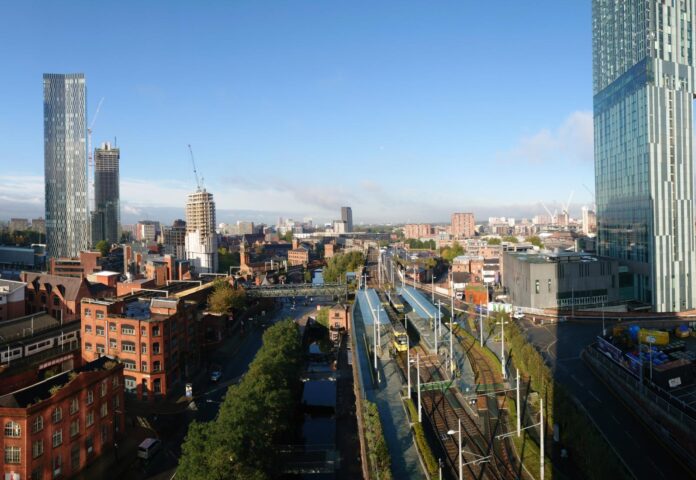A Decarbonisation Strategy for the North of England is going out to public consultation today, Monday 7 June, giving people in Greater Manchester the chance to have their say on ambitious targets to reduce carbon emissions from surface transport. It is the first time a regional strategy of this type has been produced, bringing together the region’s leaders to speak out with one voice on the climate emergency.
The strategy, developed by the region’s political and business leaders through Transport for the North (TfN), sets out the ambitious goal of achieving near-zero carbon emissions from surface transport by 2045. It highlights how the region aims to go beyond national policy and why coordination at a regional level will provide the best outcomes.
Surface transport is the largest contributing sector to greenhouse gas emissions in the UK – accounting for 22% of all emissions in 2019. The majority (95%) of this is from road transport, so opportunities around electric and alternative fuel vehicles are a key part of the developing strategy.
However, moving towards decarbonisation is not simply about lowering carbon emissions from traditional road vehicles – it can also mean making the most of opportunities such as technological advances to enhance the wider transport network and improve connectivity.
Among the potential actions and areas of focus the strategy considers are zero emission vehicles, including cars, HGVs and buses, with a comprehensive network of charging facilities to support their wider use
The decarbonisation of the rail network through electrification and the use of hydrogen and alternative fuel vehicles as well as encouraging modal shift towards more sustainable ways of travelling, such as public transport and active travel as well as opportunities for decarbonisation in the freight industry
Mayor of Greater Manchester, Andy Burnham, said: “If we are going to tackle the climate emergency, we need to work together and make sure we are all pulling in the same direction.
“Accelerating towards a decarbonised transport network must be at the heart of public policy making and investment decisions going forward, and I’m glad that the North is leading the way with this strategy as it will support Greater Manchester’s own ambitions to achieve carbon neutrality by 2038.
“I would urge all residents to give their views in this consultation to shape the future of more sustainable transport and travel in the North.”
Tim Wood, Interim Chief Executive at Transport for the North, said: “Reducing carbon across our region’s transport network is an essential part of tackling the climate emergency – one of the greatest challenges of our time. We’re thrilled to be consulting a strategy for the whole region that outlines how rapid progress can be made and how the North can lead the UK in slashing carbon emissions.
“Surface transport is the largest contributing sector to greenhouse gas emissions in the UK, accounting for 22% of all emissions in 2019. The majority of this is from road transport, so there is a clear and urgent need to decarbonise our vehicles and roads over the coming years. But we must also take action on our rail network, with a rolling programme of electrification, and encourage a shift to more sustainable forms of transport and construction practices too.
“Our Decarbonisation Strategy is a vital piece of work in moving the North of England towards the ambitious goal of near-zero carbon emissions from surface transport by 2045. Using data and insights, alongside predictions and modelling analysis, the strategy sets out the challenges and opportunities ahead, providing a clear trajectory that will not only lower emissions, but also enhance connectivity for our region’s people and businesses.
“We urge everyone in Greater Manchester to get involved in this vital work and provide their views to the consultation, helping to shape future transport networks that are not only efficient and reliable, but are sustainable too.”







